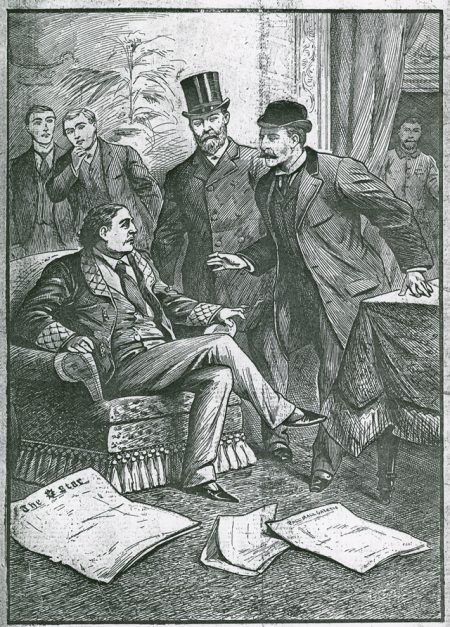Oscar Wilde, Sexuality, and the State
Where: William Andrews Clark Memorial Library & via Livestream

Conference organized by Joseph Bristow, University of California, Los Angeles
The conference is free to attend with advance registration, and will be held in-person at the Clark Library and livestreamed on the Center’s YouTube Channel. In-person registration will close on Monday, June 3 at 5:00 p.m. Seating is limited at the Clark Library; walk-in registrants are welcome as space permits.
Please visit the event webpage to register to attend.
This conference will consider both the fin-de-siècle contexts and the worldwide consequences of the three trials involving Oscar Wilde that took place at the Central Criminal Court (Old Bailey) from 3 April 1895 to 25 May 1895. These trials, which arguably constitute the most famous criminal proceedings relating to the state prohibition of male homosexuality, resulted in a brutal two-year sentence for committing acts of gross indecency with other males, for which Wilde suffered solitary confinement with hard labor. He was tried under the punitive eleventh section of the Criminal Law Amendment Act 1885: a law that underwent partial decriminalization in England and Wales in 1967 (somewhat later in Scotland and Northern Ireland).
The organizer Joseph Bristow has recently published Oscar Wilde on Trial: The Criminal Proceedings, from Arrest to Imprisonment (Yale University Press, 2022). His book features a comprehensive reconstruction of the trials through a wide range of newspaper and other printed sources. This volume–which turns to British press accounts because the official shorthand court records have been missing from the National Archives since at least 1920–is sorely needed. The last comprehensive account appeared in 1962, and it contains very uneven coverage of the ways in which the Crown prosecution used unreasonable methods to persuade the jury that Wilde was guilty of an easy-to-corroborate crime. More to the point, the 1962 edition–on which scholars still rely–presents an outdated view of male homosexual intimacy. Bristow’s volume situates the Wilde trials in relation to several other well-known cases involving homosexual scandal: the Dublin Castle affair; the male brothel on Cleveland Street; the trial of Edward de Cobain; and the Gatty v. Farquharson dispute.
Oscar Wilde, Sexuality, and the State takes the occasion of Wilde’s courtroom ordeal as a starting-point for understanding not only the growing awareness of queer subcultures during the 1880s and 1890s but also the long shadow that Wilde’s trials cast upon the proscription of same-sex intimacy in many different parts of the world. The legacy of Wilde’s imprisonment can be felt in divergent areas of the colonial and post-colonial world, especially in Australia, New Zealand, Africa, South Asia, Hong Kong, and Singapore. The fact that more than 50,000 or so men were convicted under the egregious terms of the 1885 law in Britain speaks to the increasing ways in which male-male intimacy became prosecutable during a period of seventy-two years. The conference provides the opportunity to look at the impact that charges of gross indecency had in Britain, particularly in relation to persistence of homosexual extortion, changes in policing methods, and the attempted criminalization of lesbian intimacy. The symposium provides a forum for legal and humanities scholars to exchange insights into this significant current of modern sexual history.
Speakers
Caroline Derry, The Open University
Dustin Friedman, American University
Katie Hindmarch-Watson, Johns Hopkins University
Yvonne Ivory, University of South Carolina
Benjamin Kahan, Louisiana State University
Sean O’Toole, Baruch College, City University of New York
Robert Spoo, Princeton University
Simon Stern, University of Toronto
Charles Upchurch, Florida State University
Chris Waters, Williams College
Program Schedule
All times listed in Pacific Daylight Time
Q&A to follow each presentation
Friday, June 7
8:45 a.m.
Coffee and Registration
9:15 a.m.
Director’s Welcome
Bronwen Wilson, University of California, Los Angeles
Introductory Remarks
Joseph Bristow, University of California, Los Angeles
The Wilde Trials and Nineteenth-Century Sexual Scandal
9:30 a.m.
Charles Upchurch, Florida State University
“Why the Early Nineteenth Century Matters to the Wilde Trials”
10:15 a.m.
Caroline Derry, The Open University
“Louise Mourey, Gross Indecency, and the (Non-)Criminalization of Sex between Women”
11:00 a.m.
Coffee Break
11:15 a.m.
Yvonne Ivory, University of South Carolina
“A German Sexpert at the Old Bailey? Albert Moll, Lawson Tait, and the Trials of Oscar Wilde”
12:00 p.m.
Lunch
Books and Manuscripts Exhibition in the North Book Room
“Gross Indecency”: Then and Now
1:30 p.m.
Simon Stern, University of Toronto
“On Knowing It When You See It: Forensic Evidence and the Epistemologies of Gross Indecency”
2:15 p.m.
Chris Waters, Williams College
“The Trials of Oscar Wilde and the Sexual Politics of 1950s Britain”
3:00 p.m.
Coffee Break
3:15 p.m.
Sean O’Toole, Baruch College, City University of New York
“States of Exception: Gross Indecency and U.S. Sodomy Law after Dobbs”
4:00 p.m.
Reception
Saturday, June 8
8:45 a.m.
Coffee and Registration
Oscar Wilde, Pornography, and Privacy
9:15 a.m.
Benjamin Kahan, Louisiana State University
“Timelines of Sexuality: Oscar Wilde, A. C. Swinburne, and the History of Pornography”
10:00 a.m.
Robert Spoo, Princeton University
“Infringing Dorian: Copyright, Photography, and Privacy in Oscar Wilde’s Novel”
10:45 a.m.
Coffee Break
Obscenity, Empire, and the Victorian State
11:00 a.m.
Katie Hindmarch-Watson, Johns Hopkins University
“Obscenity, Sedition, and the Victorian Post Office: Archival Fragments of a Liberal Dilemma”
11:45 a.m.
Dustin Friedman, American University
“Myth, Mimesis, and the Imperial State in Wilde’s A House of Pomegranates”
12:30 p.m.
Program Concludes